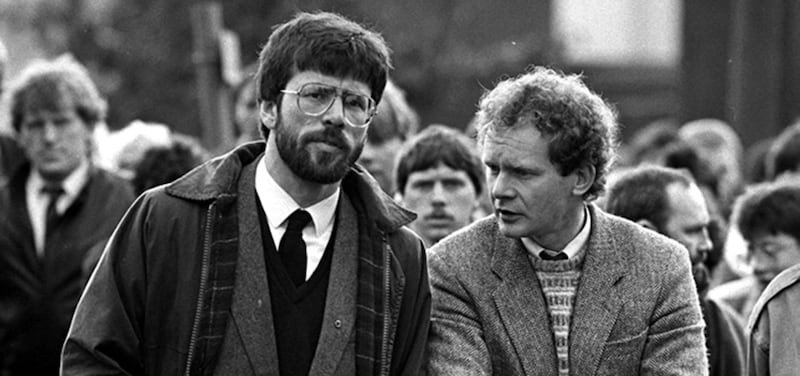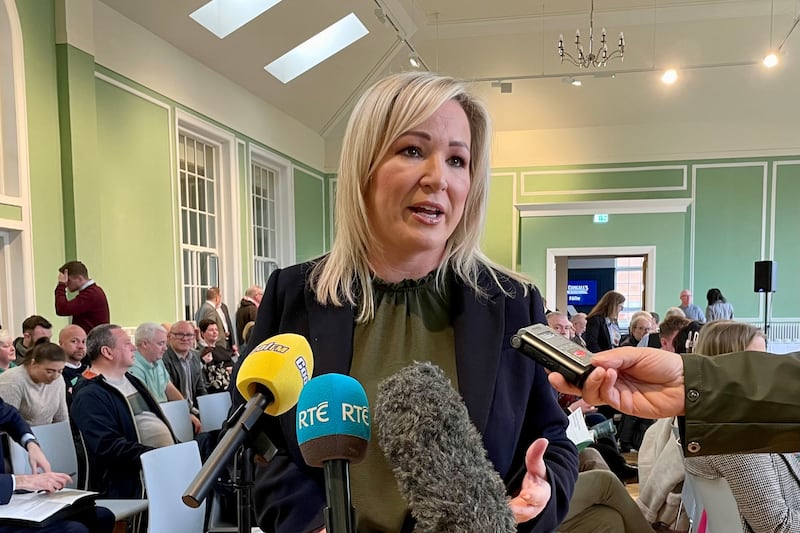GERRY Adams isn't especially surprised that 25 years on from the signing of the Good Friday Agreement, the north remains deeply divided.
He describes the region as "one of the most segregated societies in Western Europe" and believes reconciliation between the historically opposing communities will take "generations and generations".
"When you're looking at it in the realm of history, you're not going to undo centuries of division in a generation, it's going to take much longer, but what you have to do is put in place, protocols, laws and structures, which outlaw on the one hand unacceptable behaviour, and on the other hand, you educate, inform and bring people together," he says.
The former Sinn Féin leader, 49 at the time of the agreement, nevertheless believes we are in a better place today than in 1998, living in what he terms "peaceful coexistence".
"We tolerate each other and we don't deny each other," he says, before recalling relatively recent occasions where he's encountered east Belfast Protestants on the Falls Road and saw young people from the Shankill attending Féile an Phobail dance music events.
Taking the long view, and what many might regard as a realistic one, is perhaps understandable given the years of groundwork that came before the 1998 agreement.
Mr Adams believes the seeds of the republican movement's peace strategy were being sown as far back as the mid-1970s. He also regards Sinn Féin's emergence as a political force in the aftermath of the Hunger Strikes as crucial.
The discussion documents Scenario for Peace in 1987 and Towards a Lasting Peace some five years later spelled out in part the potential for bringing the conflict to a close.

A dialogue had already begun in 1986 with then SDLP leader John Hume. The two senior politicians were brought together at the invitation of Clonard-based Redemptorist Fr Alec Reid.
"I'm always a bit shocked when I reflect on it – John and I talked privately for seven years," says the former West Belfast MP of the once-maligned Hume-Adams process.
He recalls how the SDLP leader "was a victim of a vile campaign of vilification and demonisation" when in 1993 the pair's engagement became public. Yet the conversations continued in earnest. They were talking in October 1993 when an IRA bomb attack on Frizzell's fish shop on the Shankill Road killed ten people, including the bomber, Mr Adams says.
It and the reprisals that followed were a setback in a peace process that had been gathering momentum.
"It wasn't a deterrent, it was an incentive," he recalls.
Tony Blair speaks to The Irish News to mark 25 years since the Good Friday Agreement
"Because against the background of these atrocities, we actually had a template for engagement – what the result would be another matter – but we could actually start looking at an alternative."
Another shift in the dynamic, he says, was for the first time since partition "putting the Irish government front and centre as responsible for having an obligation, of having a constitutional imperative, to bring about a united Ireland, to bring about a new dispensation on the island, and so on...".
The peace process developed mostly under John Major's Conservative administration, including the IRA's 1994 ceasefire, but stalled until after the Tony Blair-led Labour landslide in 1997.
Read More
- Tom Kelly: Celebrate GFA - now is not time for its epitaph (premium)
- Tony Blair says unionism needs a leader of David Trimble's courageousness
- Bríd Rodgers acknowledges flaws of past 25 years but has no regrets over peace
- Lord Reg Empey says St Andrews was a 'catastrophe' for the Good Friday Agreement
"It [the peace process] would've carried on but it wouldn't have taken the sort of quantum leap forward if there hadn't been an end to Tory rule and a new British Labour prime minister with a very big mandate," says the former Sinn Féin president .
"We had already reached out to the Labour Party privately going into the election; it was expected that they'd win a convincing victory and, understandably, they didn't respond, except to let us know that they were listening, but you could understand they didn't want to leave themselves open to accusations at a time when the whole focus was on winning the election."
Brid Rodgers speaks to The Irish News to mark 25 years since the Good Friday Agreement
Unlike his predecessor, who Mr Adams says "was handed the potential for a peace process on a plate", Tony Blair "moved, and moved very quickly".
"I don't know if he said this publicly – he certainly said it privately – that what he did wouldn't have been possible except at the dawn of a new administration, coming in before it got caught up in all the other difficulties," he says.
The former Louth TD also gives credit to both Bertie Ahern and his predecessor Albert Reynolds, adding that the latter's role is "often neglected".
In a recent interview with the BBC, the former Sinn Féin leader said only after the death of political contemporary David Trimble did he fully appreciate how "brave" the former Ulster Unionist leader had been at the time of the agreement.
When asked who took the most risks at that time, Mr Adams shrugs.
"You're talking about political risk – sure what's political risk?" he asks rhetorically "...isn't it part of the equation?"
"We in the Sinn Féin leadership were at risk; some were killed and some of us were wounded, and our party had been actively targeted, so I don't relate to the question about who took risk."
He qualifies this by saying he doesn't "want to appear either blasé or stupid" before describing risk as an "occupational hazard". In his time as Sinn Féin president, Mr Adams was shot by loyalists in Belfast city centre, and his family home bombed twice.
Reg Empey speaks to The Irish News to mark 25 years since the Good Friday Agreement
"In one case, there was a grenade which had been brought in from South Africa," he recalls.
"I still have the lever – the RUC remarkably didn't find in the front garden."
One principle republicans conceded was accepting what was once called the 'unionist veto', which in the agreement morphed into the principle of consent, a recognition of partition that could only be reversed with the support of 50 per cent-plus one in the north.
"It wasn't such a big issue when you take it in an Irish context," Mr Adams says.
"The whole thing was couched in terms where nothing could happen unless the unionists agree to it – and of course that's all acceptable – but if you remove the British from the equation, the fact is you have to deal with this large number of people who live in this part of the island, who have their own view of the world and their own concerns and interests.
"You can't go forward unless you get enough of them to take ownership of a new dispensation and, and make it work to get into partnership with the rest of us."
And does he believe the cause of Irish unity has been advanced in the years since the agreement, more so than in the previous 25?
"It's difficult to do a comparison but certainly we now have what we never had before – a mechanism to end the union, a peaceful mechanism..." the former West Belfast MP says.
"The men and women of 1916 didn't have that mechanism; Bobby Sands didn't have that mechanism. It didn't exist, so that's a big advance."
He says neither the British or Irish governments want a referendum, and believes the latter could do much more to advance the cause of unity.
Mr Adams also argues that "for the first time since partition, it [the discussion around Irish unity] is "now a substantive public talking point".








